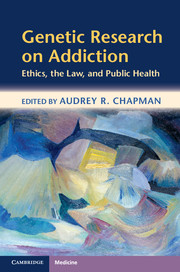Book contents
- Frontmatter
- Contents
- Contributors
- Preface
- Section 1 Introduction
- Section 2 Research ethics
- 4 Improving the informed consent process in research with substance-abusing participants
- 5 Ethical considerations in genetic research with children affected by parental substance abuse
- 6 Protecting privacy in genetic research on alcohol dependence and other addictions
- 7 Certificates of Confidentiality: Uses and limitations as protection for genetic research on addiction
- 8 Ethical issues in human genomic databases in addiction research
- 9 Should addiction researchers accept funding derived from the profits of addictive consumptions?
- 10 Ethical issues related to receiving research funding from the alcohol industry and other commercial interests
- Section 3 Translating addiction research
- Section 4 Conclusions
- Index
- References
4 - Improving the informed consent process in research with substance-abusing participants
from Section 2 - Research ethics
Published online by Cambridge University Press: 05 September 2012
- Frontmatter
- Contents
- Contributors
- Preface
- Section 1 Introduction
- Section 2 Research ethics
- 4 Improving the informed consent process in research with substance-abusing participants
- 5 Ethical considerations in genetic research with children affected by parental substance abuse
- 6 Protecting privacy in genetic research on alcohol dependence and other addictions
- 7 Certificates of Confidentiality: Uses and limitations as protection for genetic research on addiction
- 8 Ethical issues in human genomic databases in addiction research
- 9 Should addiction researchers accept funding derived from the profits of addictive consumptions?
- 10 Ethical issues related to receiving research funding from the alcohol industry and other commercial interests
- Section 3 Translating addiction research
- Section 4 Conclusions
- Index
- References
Summary
History of informed consent
The most important medical and behavioral advances made in the last century, including vaccinations for diseases such as smallpox and polio, required years of testing, often with human participants. Unfortunately, many were made at the expense of marginal and highly vulnerable populations, including asylum inmates, prisoners, and non-institutionalized minorities. In fact, study participants were often involved in clinical trials without ever being informed. Revelations about the horrors of World War II and the medical experiments that were performed by the Nazis as well as unethical investigations conducted within the United States, including the Tuskegee syphilis study (Centers for Disease Control and Prevention, 2011), the Milgram experiment (Milgram, 1974), and the human radiation experiments (see Welsone, 1999, for a review), heightened public awareness of the potential for research misconduct.
For over 60 years, the international and US medical communities have taken numerous steps to protect people who take part in clinical research. The Nuremberg Code (1950) was the first major international document to provide guidelines on research ethics. It was developed in response to the Nuremberg Trials of Nazi doctors who performed unethical experimentation during World War II. The Nuremberg Code made voluntary consent a requirement in clinical research studies and outlined that consent can be voluntary only if: (1) the participants are able to consent; (2) they are free from coercion (i.e., outside pressure); and (3) they comprehend the risks and benefits involved. Furthermore, the Nuremberg Code states that researchers should minimize risk and harm, ensure that potential risks do not significantly outweigh potential benefits, use appropriate study designs, and guarantee the participants’ freedom to withdraw at any time. It was adopted by the United Nations General Assembly in 1948.
- Type
- Chapter
- Information
- Genetic Research on AddictionEthics, the Law, and Public Health, pp. 41 - 60Publisher: Cambridge University PressPrint publication year: 2012
References
- 2
- Cited by



